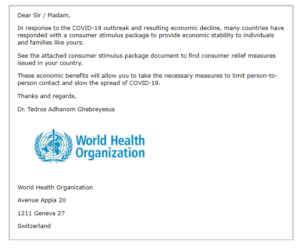When Cooper entered the sixth week of fighting the invisible COVID-19 enemy, we were also fighting a second invisible enemy: the hacker. Just as we remain vigilant in combatting COVID-19, we must also remain vigilant in fighting the hackers.
Cooper’s response to COVID-19 has been nothing short of heroic. Part of that response is an exponential increase in the number of teleworkers and implementing a telemedicine program—both of which allow Cooper to continue its exceptional care to our patients. Both of these, however, significantly amplify the threat to Cooper, its employees, and its patients. The Department of Homeland Security’s Cybersecurity and Infrastructure Agency (CISA) continues to report malicious cyber actors are using COVID-19-themed phishing attacks to gain credentials or deploy malware (Alert).
The malicious actors are attempting to take advantage of your concerns around the pandemic to trick you into clicking on a link or opening an attachment that either leads to a phishing attack or downloads malware, including ransomware (Alert). They have seen, for example, emails with COVID-19-related phrases such as “Corona Virus Update” or “2019-nCov Coronavirus Outbreak in your city (Emergency).” The hackers may also name malicious attachments with coronavirus themed names such as “President discusses budget savings due to coronavirus with cabinet.rtf.”
To make the emails seem more realistic, the hackers often fake (spoof) the sender information to make it appear to come from a trustworthy source like the World Health Organization or the Center for Disease Control (Alert). Here is an example of a fake message:

Your continued vigilance in this war against malicious cyber actors will allow Cooper to better protect and treat our patients. We encourage you to take the following precautions as CISA outlines in Defending Against COVID-19 Cyber Scams:
- Do not click links or open attachments in unsolicited emails.
- Use trusted sources for current information on COVID-19.
- Never respond to requests for personal or financial information in an email.
- Always verify a charity’s authenticity before making a donation.
If you have any questions, please contact Phil Curran at 856.536.1317.
If you believe you have clicked on a suspicious link or opened a suspicious attachment, immediately contact the Cooper Help Desk at 856.968.7166.
References:
Alert (AA20-099A). (2020, April 8). Retrieved April 14, 2020, from https://www.us-cert.gov/ncas/alerts/aa20-099a
Defending against covid-19 cyber scams. (2020, March 6). Retrieved April 14, 2020, from https://www.us-cert.gov/ncas/current-activity/2020/03/06/defending-against-covid-19-cyber-scams
